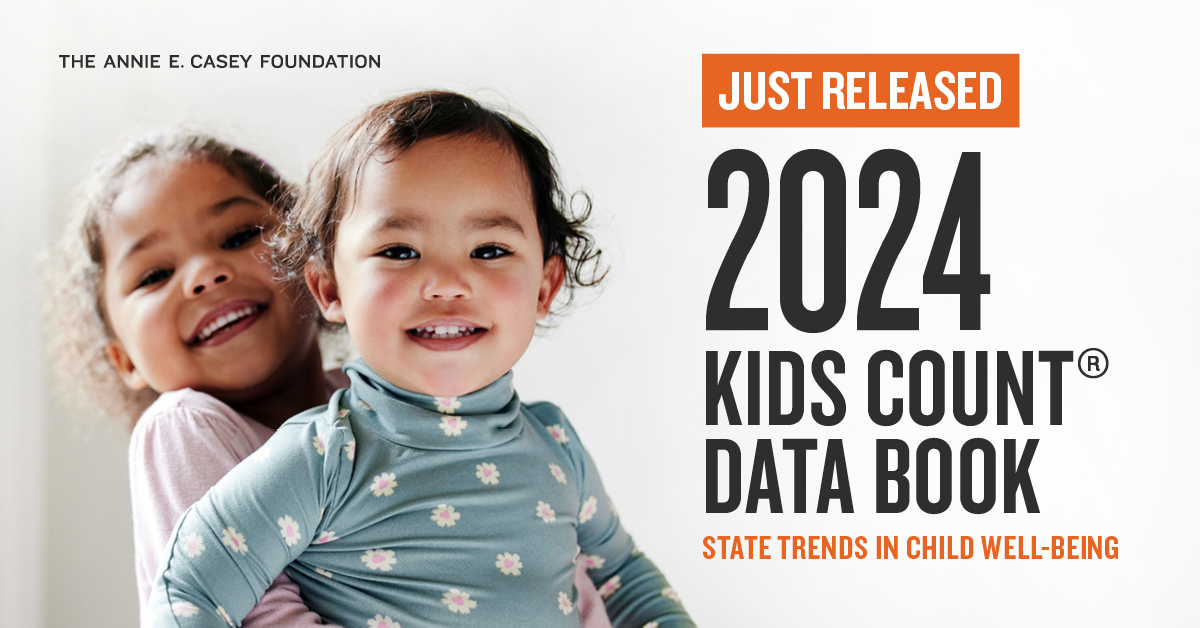New Hampshire Ranks 1st in Child Well-Being, but Absence Rates, Drop in Test Scores Indicate Concerning Trend

50-State Annie E. Casey Foundation Data Shows Academic Outcomes, Absences are Linked to Poverty, Trauma; Policymakers Must Act to Promote Kids' Future Success
CONCORD, NEW HAMPSHIRE - New Hampshire once again ranks as the best state in the country for child well-being, according to a new national report. However, in the Granite State and across the United States, school absence rates and dropping test scores threaten to have academic, health, and financial impacts on children and families, leaving billions of dollars in future earnings and trillions in lost economic activity at stake.
The 2024 KIDS COUNT® Data Book, a 50-state report of recent data released this week by the Annie E. Casey Foundation, presents national and state data from 16 indicators across four domains–economic well-being, education, family and community, and health factors - and ranks states according to how children are faring.
Based on these indicators, New Hampshire has been named the top state for the second straight year. However, the Data Book,reports that in 2021-22 more than one in three Granite State children experienced one or more Adverse Childhood Experiences (ACEs), such as family economic hardship, incarcerated or deceased parents, witnessing domestic violence, or living with someone with a mental illness or substance use problem. The Data Book also indicates that 33 percent of school-age children in New Hampshire were chronically absent in 2021-22.
“Children in New Hampshire must have the support and resources to show up to school ready to learn,” said Rebecca Woitkowski, Child and Family Policy Director at New Futures, New Hampshire’s leading health policy and advocacy organization and home of New Hampshire Kids Count. “The best way for the state to mitigate adverse childhood experiences is by continuing to support home visiting programs, investing in resources for postpartum moms, and working towards a solution to the state’s child care crisis.”
In its 35th year of publication, the KIDS COUNT® Data Book focuses on students’ lack of basic reading and math skills, a problem decades in the making but brought to light by the focus on learning loss during the COVID-19 pandemic. Unprecedented drops in learning from 2019 to 2022 amounted to decades of lost progress. Chronic absence has soared, with children living in poverty especially unable to resume their school day routines on a regular basis.
Each year, the Data Book presents national and state data from 16 indicators in four domains — economic well-being, education, health, and family and community factors — and ranks the states according to how children are faring overall.
Key findings from the most Data Book include:
- New Hampshire ranked 2nd in economic well-being. Still, 17,000 Granite State children (7 percent) were in poverty in 2022, and 48,000 (19 percent) have parents who lacked secure employment.
- New Hampshire ranked 4th in education, but 63 percent of fourth-graders were not proficient in reading, and 71 percent of eighth-graders were not proficient in math in 2022.
- New Hampshire ranked 1st in health, but in 2022, 6.7 percent of babies were born at a low birth rate and 3 percent of children were without health insurance, limiting their access to care.
- New Hampshire ranked 2nd in family and community. The number of Granite State children living in single-parent families continues to rise, reaching 29% — up from 27% in 2019.
Moreover, state averages mask disparities that affect students of color, kids in immigrant families and children from low-income families or attending low-income schools.
“This critical data shows us that there is more New Hampshire can do to better support the whole family, to help children thrive in school and throughout their lives,” added Woitkowski. “Children who go to school hungry, or who do not have stable housing, are less likely to be ready to learn which can lead to lower test scores and graduation rates and have other impacts that follow them into adulthood.”
The Casey Foundation report contends that the pandemic is not the sole cause of lower test scores: Educators, researchers, policymakers and employers who track students’ academic readiness have been ringing alarm bells for a long time. U.S. scores in reading and math have barely budged in decades. Compared to peer nations, the United States is not equipping its children with the high-level reading, math and digital problem-solving skills needed for many of today’s fastest-growing occupations in a highly competitive global economy.
This lack of readiness will result in major harm to the nation’s economy and to our youth as they join the workforce. Up to $31 trillion in U.S. economic activity hinges on helping young people overcome learning loss caused by the pandemic. Students who don’t advance beyond lower levels of math are more likely to be unemployed after high school. One analysis calculates the drop in math scores between 2019 and 2022 will reduce lifetime earnings by 1.6% for 48 million pandemic-era students, for a total of $900 billion in lost income.
However, some states have delayed spending their share of the $190 billion critical federal pandemic funding that could help boost achievement. In New Hampshire, roughly $327 million – about one-third of the $994 million the State received in COVID funding in 2021 and 2022 – had not been obligated or spent, as of the end of March 2024. This funding, which will be returned to the federal government if it is not obligated by the end of 2024 – could help to support children and families in a variety of ways.
The Foundation recommends the following:
- To get kids back on track, we must make sure they arrive at the classroom ready to learn by ensuring access to low- or no-cost meals, a reliable internet connection, a place to study and time with friends, teachers and counselors.
- Expand access to intensive tutoring for students who are behind in their classes and missing academic milestones. Research has shown the most effective tutoring is in person, high dosage and tied directly to the school.
- States should take advantage of all their allocated pandemic relief funding to prioritize the social, emotional, academic and physical well-being of students. As long as funds are obligated by the Sept. 30 deadline, states should have two more full years to spend them.
- States and school systems should address chronic absence, so more students return to learn. While few states gather and report chronic absence data by grade, all of them should. Improving attendance tracking and data will inform future decision-making. Lawmakers should embrace positive approaches rather than criminalizing students or parents due to attendance challenges, because they may not understand the consequences of even a few days missed.
- Policymakers should invest in public schools that provide wraparound support to kids and families. Natural homes for tutoring, mental health support, nutritional aid and other services, community schools use innovative and creative programs to support young learners and encourage parent engagement, which leads to better outcomes for kids.
###
RELEASE INFORMATION
The 2024 KIDS COUNT® Data Book is available at www.aecf.org. Additional information is available at www.aecf.org/databook. Journalists interested in creating maps, graphs and rankings in stories about the Data Book can use the KIDS COUNT Data Center at datacenter.aecf.org.
ABOUT THE ANNIE E. CASEY FOUNDATION
The Annie E. Casey Foundation creates a brighter future for the nation’s young people by developing solutions to strengthen families, build paths to economic opportunity and transform struggling communities into safer and healthier places to live, work and grow. For more information, visit www.aecf.org. KIDS COUNT® is a registered trademark of the Annie E. Casey Foundation.
ABOUT NEW FUTURES, HOME OF NH KIDS COUNT
For more than 25 years, New Futures has provided nonpartisan, evidence-based solutions to New Hampshire’s health challenges. New Futures works to build bridges among policymakers and secure the passage of laws that improve access to early childhood supports, health insurance, substance use treatment, and prevention programming. Through policy change, we can ensure that social service programs and statewide systems work for everyone. For more information, visit new-futures.org.

